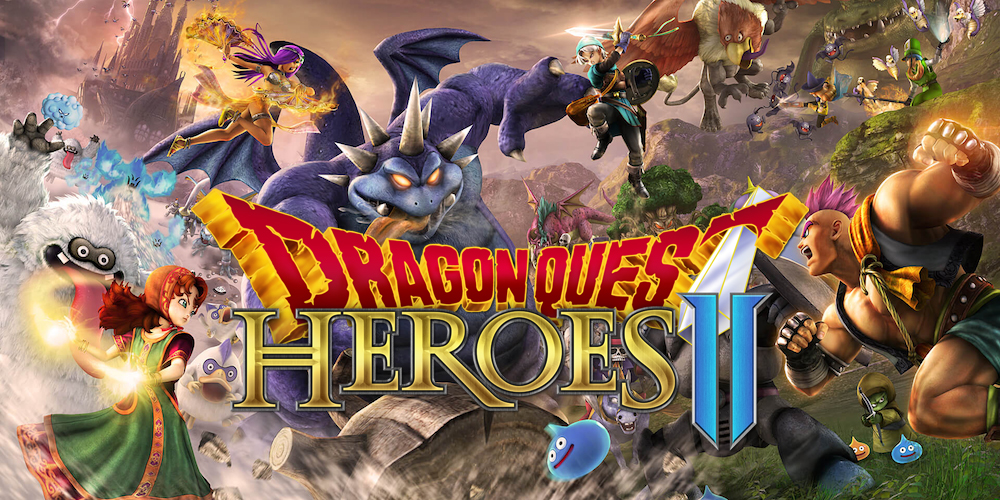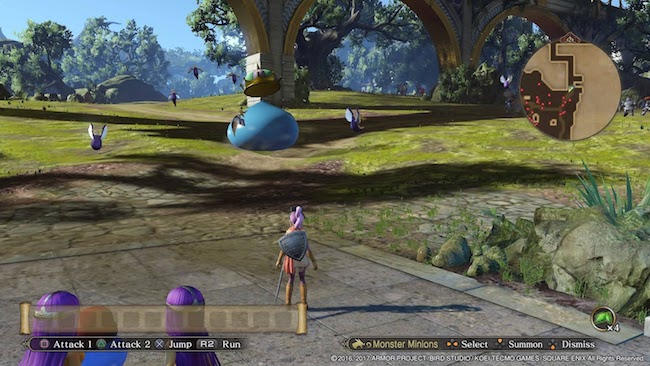
If Dragon Quest Heroes II: Twin Kings and the Prophecy’s End was personified, it would be the second child of a successful doctor-lawyer union, who is expected to attend Harvard and is being pressured to study multiple languages, excel at all sports, and be an improved version of their older sibling. What I’m saying (through that borderline nonsensical and hopefully not too relatable analogy) is that being the product of successful publisher Square Enix and developer Omega Force, claiming both the RPG (through its connection to Dragon Quest) and hack and slash (through its connection to Dynasty Warriors) genres, and being a sequel, means there is much to be expected from DQ Heroes 2.
In many ways, the game lives up to the expectation. This is in no small part thanks to the traditional Dragon Quest style plot and strong characterisation. The story follows cousins, Lazarel and Teresa, who take action when a seemingly unprovoked war breaks out in their kingdom for the first time in 1000 years. They are compelled to investigate because the conflict is between the city within which they were raised and the capital city. Cue a series of quests to uncover the truth, with NPCs from previous Dragon Quest main series titles to keep you company.

One of my biggest issues with the previous game was the “suddenly all the monsters are evil” crux of the plot and unrealistic characterisation. By comparison, DQ Heroes 2, delivers a distinct, engaging plot with relatable, likeable characters. Plot points are delivered through expertly crafted cut scenes with quality voice acting, always leaving the player seeking answers and encouraging them to continue the game. Even the necessary combat tutorial weaves into the plot nicely and is tied in with the early establishment of character relationships and identity.
The world within which the game is set has also seen an improvement since the first DQ Heroes- there are now elements of open world exploration rather than just a hub world from which players entered battle/ canned missions. Monsters are littered throughout the terrain that links certain areas together, and players are allowed to wander freely through unlocked areas. In this sense, it is much more like the traditional Dragon Quest games rather than Dynasty Warriors (the two games upon which DQ Heroes is based).

Unfortunately, the semi-open world that Omega Force has created is void of any real substance and ends up feeling soulless. These areas just seemed to be filled with uninspired terrain (this is untrue for the mission areas) and swathes of initially non-hostile monsters to mow down. As a consequence, I found myself trying to speed through these sections of the game to progress to the next cut scene. It reminded me of times when I would speed read through “boring” chapters in Game of Thrones so that I could return to the chapters involving the interesting characters.
Being the product of Dynasty Warriors developer, Omega Force, combat was always going to be one of the primary focuses of DQ Heroes 2. Omega Force delivers on this promise. Combat is all about flashy combos, hit streaks, and over the top special attacks on large hordes of (or just plain large) Akira Toriyama monsters. The mechanics are simple, and most battles will allow you to get away with mashing one of two attack buttons and the occasional dodge. However, there is a fluidity to the character movements, and the transition between spells and straight damage attacks feels refined when compared to DQ Heroes 1. Combat scenarios are no longer limited to tower defence missions, and it feels as though the monsters have become slightly more difficult to defeat. Players can switch between all the members of their party that they have taken into battle. Unfortunately, additional party members remain as useless as ever when not controlled by the player.

Unlike the previous title, DQ Heroes 2 features multiplayer, thus allowing friends or family to provide your party members with enthusiasm for battle they so desperately need. While I view this as a welcome addition to the DQ Heroes games, the current multiplayer has been executed poorly. Friends, family, or other random adventurers can only jump in to assist with missions they have already completed on their local copy of the game. Further, co-op is only online, and players are disconnected from the co-op once the mission has been completed. The task of finding your IRL friend again on the matchmaker is arduous. Why can’t they stick with you throughout your quest? Or better yet, how about some local split-screen multiplayer?
While combat is a big part of DQ Heroes 2, Omega Force has tried to diversify their interests by incorporating more RPG elements. There are skill trees and a plethora of customizable weapons, meaning each party member can be built in a unique way- and the protagonists can now switch from warrior to mage class if the player desires. When defeated in battle, monsters drop mini medals. These can be used to transform the player into the corresponding monster during battle, to unleash different types of attacks or just simply fight with different attributes. Most importantly, quests/ missions are no longer locked to being repetitive tower defence- horde battles. This provides a diversity of gameplay that was sorely lacking in the previous title. Sadly, many of these new types of quests/ missions feel like errand-running filler quests that are mindless.

Dragon Quest Heroes II is a game that is having an identity crisis. Omega Force has not fully committed to the hack and slash genre or the RPG genre, so the game ends up occupying an awkward middle ground. To be fair, it is a marked improvement on the original. The plot and aesthetic elements are of high quality, the missions and combat situations are much more varied, and the combat mechanics have been streamlined. It’s playable, and some aspects of the experience are enjoyable…but, it still felt like a “Jack of all trades…” experience, as many elements are executed quite poorly.











